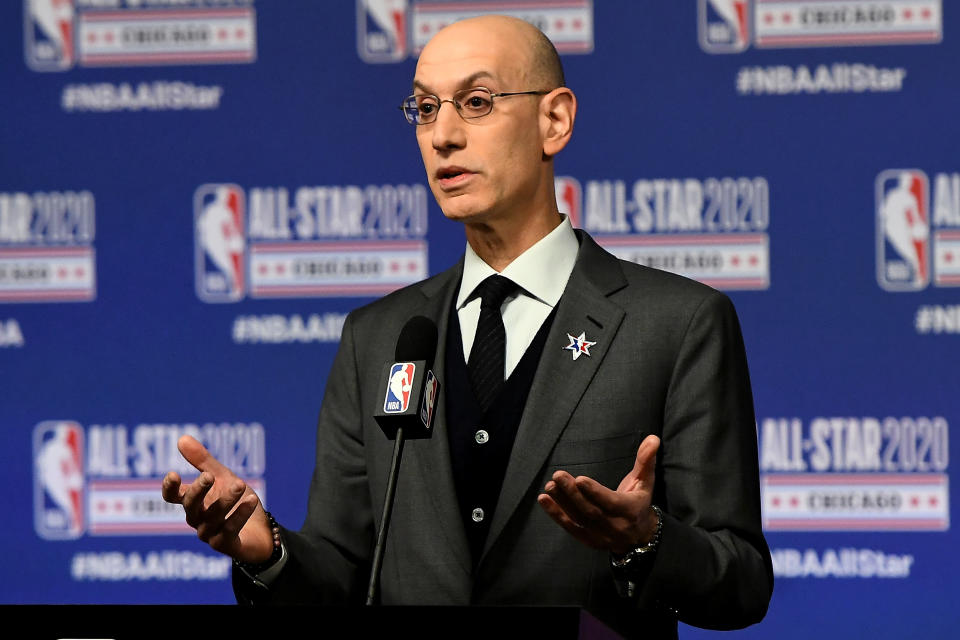Why NBA commissioner Adam Silver’s coronavirus response was the wakeup call America needed
In hindsight, it all seemed inevitable. The cancellations. The social distancing. The quarantining. In the moment though, it didn’t. At least not for many Americans.
It was, “Wash your hands. Cough into your sleeve. It’s just the flu.”
The tremors of change were out there. SXSW was canceled. The Indian Wells tennis tournament was canceled. College basketball played in fanless arenas.
Then NBA commissioner Adam Silver, driving home from the office around 8 p.m. ET Wednesday, got word that Rudy Gobert of the Utah Jazz had tested positive for the coronavirus. Silver had just spent hours on a league-wide conference call designed to gather information from public health officials and formulate a plan going forward.
A decision — most likely to continue playing, but with no fans — was to be made Thursday.
Instead it had to be made now, just as the Jazz were expected to tipoff in Oklahoma City.
“Once his test came back positive, we had to decide whether to play the game,” Silver said on TNT Thursday.
The teams were ready to go. Fans were at the arena. Tipoff was delayed. Silver conferred with Oklahoma City owner Clay Bennett and Thunder general manager Sam Presti and health officials in Oklahoma. The decision was simple. Postpone it.
Then Silver went one step further and suspended the NBA season indefinitely beginning with Thursday’s slate, a decision that seemed to send a shock through the American consciousness that no previous decision had.

No NBA? This felt … very real. At least for a lot of people.
“There is an issue in how quickly this virus is spreading,” Silver would explain on TNT. “We are relying on the public health experts. What they are telling us is if you can so-called ‘shift the curve’ or ‘flatten the curve,’ if we can push out how quickly this spreads as a public health matter, we’re doing a service for the country.
“Because particularly for old people, if a lot of people get sick quickly, we’re going to run out of resources, we’re going to run out of respirators, ICU beds and etc.,” Silver continued.
The term “flatten the curve” was rarely uttered a week ago. It’s non-stop now, aiding with the concept that individual sacrifice is needed for the common good.
Silver has always been a strong leader for the NBA. He’s made mistakes. He’s struggled occasionally. His ability to forcefully and convincingly explain his viewpoint though has always been his strong suit.
Here was a smart, sensible, serious person making a very big decision that would cost his business incredible amounts of money, and then laying out in clear and concise ways why it had to be done.
A tidal wave of cancellations of mass gatherings soon followed. The NHL. MLS. Major League Baseball. High school and youth sports. Even schools themselves. College basketball straight through the Final Four. Golf and NASCAR, and all of sudden everything seemed different.
Again, it was inevitable, and if anything, the NBA was late to this decision — even waiting until near tipoff to cancel the last NBA game Wednesday night. They weren’t proactive, just more proactive in relation to many others.
Still, it remains notable, at least, that the quick decision of a sports executive seemingly had such a profound effect on how the coronavirus was viewed, and what big organizations and single individuals alike can do to help the situation.
He’s the commissioner of the NBA, not a politician or a doctor or a famed television anchor.
No one knows how this turns out. That’s the scary part. The roadmap is a hope map, riddled with variables. If we’re lucky, though, the decision by the NBA to suspend the season, and the viral videos of reactions from players and fans, may have sped up America's reaction by a day or days at a time when a day or days is critical.
Gobert, of course, has been vilified for his actions in the wake of his diagnosis. His behavior was reprehensible. In the most unfortunate of ways, he actually served as a perfect illustration of how dangerous it is for anyone to act the way he did — and how many people he may have put at risk. Simply put, don’t be selfish.
Does it help? Hopefully.
This can’t just be about people shrugging and saying, “Well, it won’t kill me.” It has to be about thinking of all of those who it might: the elderly, the infirm, even the healthy who find themselves on the wrong side of some percentage.
That’s what we should be about. America would have gotten to that point soon enough. Yet every public health official said there is no such thing as soon enough.
In an unexpected way, it was the NBA commissioner, of all people, who helped make that clear to millions of us.
More from Yahoo Sports:

 Yahoo Finance
Yahoo Finance 
